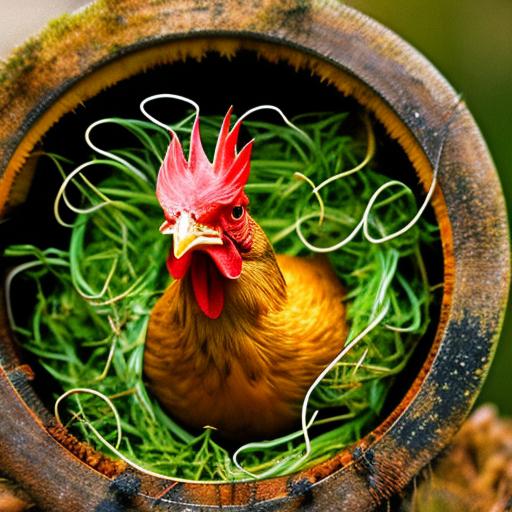Roosters play an important role in a chicken flock, but not everyone chooses to keep them. In a traditional chicken flock, the rooster is responsible for protecting the hens, fertilizing the eggs, and maintaining order within the flock. However, some people prefer to keep chickens without a rooster for various reasons. In this article, we will explore the benefits of keeping chickens without a rooster, the differences in behavior and egg production between hens and roosters, factors to consider when deciding to keep chickens without a rooster, tips for choosing the right breeds for a rooster-free flock, understanding the social hierarchy of a rooster-free chicken flock, the importance of providing adequate living conditions for chickens without a rooster, strategies for managing broody hens in a rooster-free flock, common challenges of keeping chickens without a rooster and how to overcome them, and finally, making the decision to keep chickens without a rooster.
Key Takeaways
- Keeping chickens without a rooster is possible and has many benefits.
- Hens and roosters have different behaviors and egg production rates.
- Factors to consider when deciding to keep chickens without a rooster include noise, aggression, and fertilization.
- Choosing the right breeds for a rooster-free flock is important for egg production and social dynamics.
- Understanding the social hierarchy of a rooster-free chicken flock is crucial for managing behavior and egg production.
Benefits of Keeping Chickens without a Rooster
One of the main benefits of keeping chickens without a rooster is that you don’t have to deal with the noise of crowing. Roosters are known for their loud and early morning crowing, which can be disruptive to neighbors or anyone who wants to sleep in. By keeping only hens in your flock, you can avoid this noise issue.
Another benefit is that you won’t have fertilized eggs. If you don’t want to breed your chickens or have no need for fertilized eggs, then keeping hens alone is a practical choice. Hens are capable of laying eggs without the presence of a rooster. These eggs are unfertilized and can still be consumed or used for cooking purposes.
Differences in Behavior and Egg Production between Hens and Roosters
Hens and roosters have distinct differences in behavior. Roosters are known to be more aggressive and territorial compared to hens. They will often protect the flock from predators and other threats. Roosters also establish a pecking order within the flock, ensuring that each hen knows her place.
In terms of egg production, hens are the ones responsible for laying eggs. They will typically start laying eggs at around 5-6 months of age and will continue to do so for several years. Roosters, on the other hand, do not lay eggs. Their main role is to fertilize the eggs laid by the hens.
Factors to Consider when Deciding to Keep Chickens without a Rooster
When deciding whether or not to keep chickens without a rooster, there are several factors to consider. One factor is noise ordinances in your area. If you live in a residential neighborhood with strict noise regulations, it may be best to avoid keeping a rooster to avoid any potential conflicts with your neighbors.
Personal preferences also play a role in this decision. Some people simply prefer the quieter and more peaceful atmosphere of a rooster-free flock. Additionally, if you have young children or pets that may be at risk of being attacked by a rooster, it may be safer to keep only hens.
However, it’s important to note that some people choose to keep a rooster for protection purposes or for breeding purposes. Roosters can be effective in deterring predators and can also be used for breeding if you are interested in expanding your flock.
Tips for Choosing the Right Breeds for a Rooster-Free Flock
If you have decided to keep chickens without a rooster, there are certain breeds that are known for being quieter and less aggressive. Some of these breeds include Australorps, Orpingtons, and Silkies. These breeds are known for their calm and docile nature, making them a good choice for a rooster-free flock.
In addition to considering temperament, it’s also important to choose breeds that are good for egg production. Some breeds that are known for their high egg production include Leghorns, Rhode Island Reds, and Sussex. These breeds will ensure that you have a steady supply of eggs even without a rooster.
Understanding the Social Hierarchy of a Rooster-Free Chicken Flock

In a rooster-free chicken flock, the social hierarchy is established by the hens themselves. Without a rooster to maintain order, the hens will establish their own pecking order. This pecking order determines which hen is dominant and which ones are subordinate.
The establishment of the pecking order can sometimes lead to aggression between hens. The dominant hen may peck or chase away the subordinate hens to assert her dominance. It’s important to provide enough space and resources for all the hens to minimize aggression and ensure a harmonious flock.
Importance of Providing Adequate Living Conditions for Chickens without a Rooster
Whether you have a rooster or not, it’s crucial to provide adequate living conditions for your chickens. This includes providing enough space for them to roam and exercise, as well as providing shelter from the elements. A well-ventilated coop with nesting boxes and perches is essential for their comfort and safety.
Proper nutrition is also important for chickens without a rooster. They should be fed a balanced diet that includes a mix of grains, protein, and fresh fruits and vegetables. Access to clean water should also be provided at all times.
Strategies for Managing Broody Hens in a Rooster-Free Flock
A broody hen is one that wants to sit on her eggs and hatch them into chicks. However, without a rooster, these eggs will not be fertilized and will not hatch. Managing broody hens in a rooster-free flock can be challenging, as they may become aggressive and refuse to leave the nest.
One strategy for managing broody hens is to remove them from the nest and provide them with a separate area away from the other hens. This can help break their broodiness and encourage them to resume normal behavior. Another strategy is to provide distractions, such as fake eggs or golf balls, to discourage them from sitting on the nest.
Common Challenges of Keeping Chickens without a Rooster and How to Overcome Them
One common challenge of keeping chickens without a rooster is aggression between hens. As mentioned earlier, the establishment of the pecking order can sometimes lead to aggression. To overcome this challenge, it’s important to provide enough space and resources for all the hens. This includes having multiple feeding and watering stations, as well as providing enough space for them to roam and exercise.
Another challenge is the lack of fertilized eggs. If you are interested in breeding your chickens or hatching chicks, you will need to find alternative methods such as artificial insemination or purchasing fertilized eggs from a breeder.
Making the Decision to Keep Chickens without a Rooster
In conclusion, keeping chickens without a rooster has its benefits and challenges. The decision ultimately depends on your personal preferences and circumstances. If you value peace and quiet, don’t want to deal with fertilized eggs, or have restrictions in your area regarding roosters, then keeping only hens may be the right choice for you. However, if you are interested in breeding or want the added protection that a rooster provides, then keeping a rooster may be worth considering. Whatever decision you make, it’s important to provide adequate care and living conditions for your chickens to ensure their health and well-being.
If you’re considering keeping chickens but are unsure if you need a rooster, you’ll find the answer in this informative article from Poultry Wizard. They provide valuable insights into the topic, discussing whether it’s possible to keep chickens without a rooster and the benefits and drawbacks of doing so. To learn more about this fascinating subject, check out their article at https://poultrywizard.com. Additionally, Poultry Wizard offers other helpful articles such as “How Long for Chicken Eggs to Hatch Naturally?” (link) and “How Many Chickens Do You Need for a Family of 4?” (link).
FAQs
What is a rooster?
A rooster is a male chicken that is responsible for fertilizing eggs and crowing to signal the start of a new day.
Do I need a rooster to keep chickens?
No, you do not need a rooster to keep chickens. Hens will lay eggs regardless of whether or not there is a rooster present.
What are the benefits of keeping chickens without a rooster?
Keeping chickens without a rooster means you won’t have to deal with the noise and aggression that can come with having a rooster. Additionally, you won’t have to worry about fertilized eggs if you don’t want to hatch chicks.
Can hens lay eggs without a rooster?
Yes, hens can lay eggs without a rooster. However, these eggs will not be fertilized and will not hatch into chicks.
What happens if I do have a rooster?
If you have a rooster, he will fertilize the eggs laid by the hens. This means that the eggs have the potential to hatch into chicks if they are incubated properly.
Do I need a rooster to have fresh eggs?
No, you do not need a rooster to have fresh eggs. Hens will lay eggs regardless of whether or not there is a rooster present.
Meet Walter, the feathered-friend fanatic of Florida! Nestled in the sunshine state, Walter struts through life with his feathered companions, clucking his way to happiness. With a coop that’s fancier than a five-star hotel, he’s the Don Juan of the chicken world. When he’s not teaching his hens to do the cha-cha, you’ll find him in a heated debate with his prized rooster, Sir Clucks-a-Lot. Walter’s poultry passion is no yolk; he’s the sunny-side-up guy you never knew you needed in your flock of friends!







